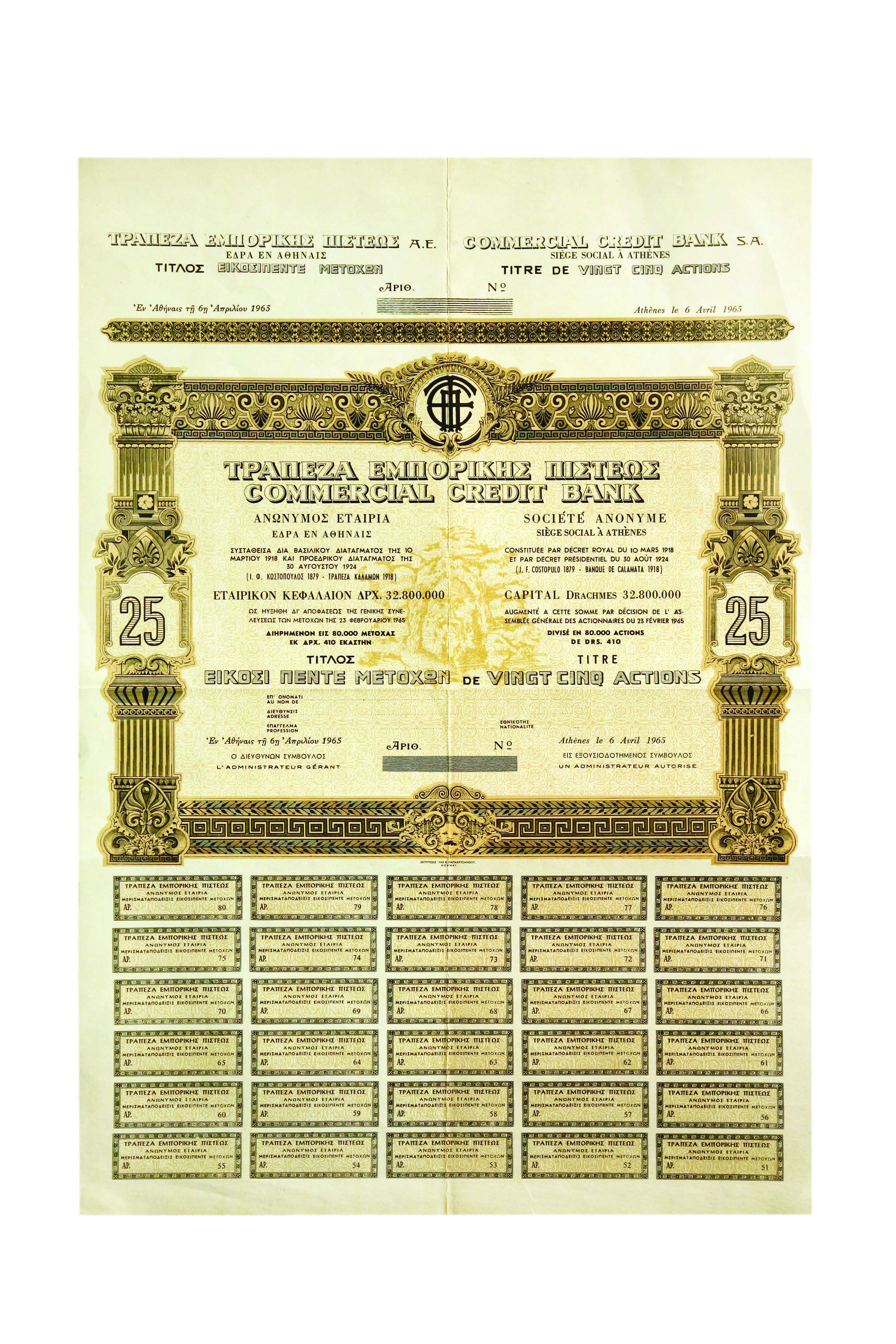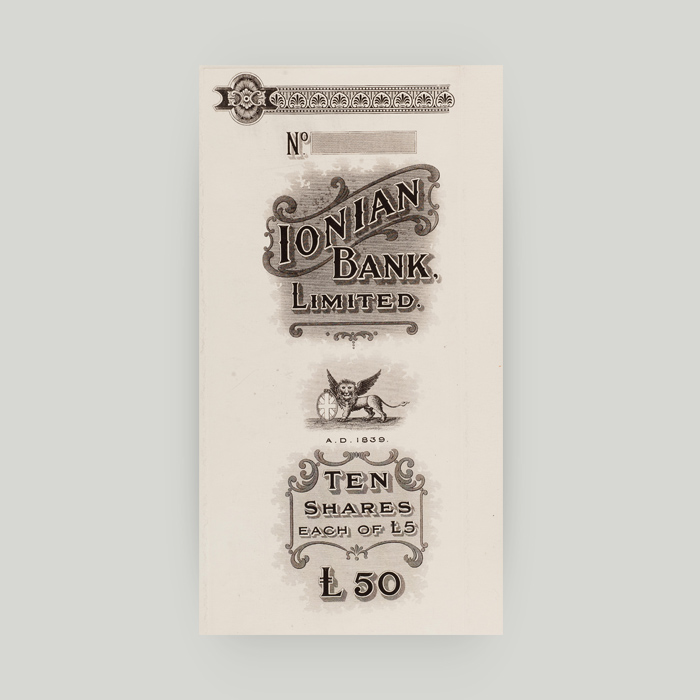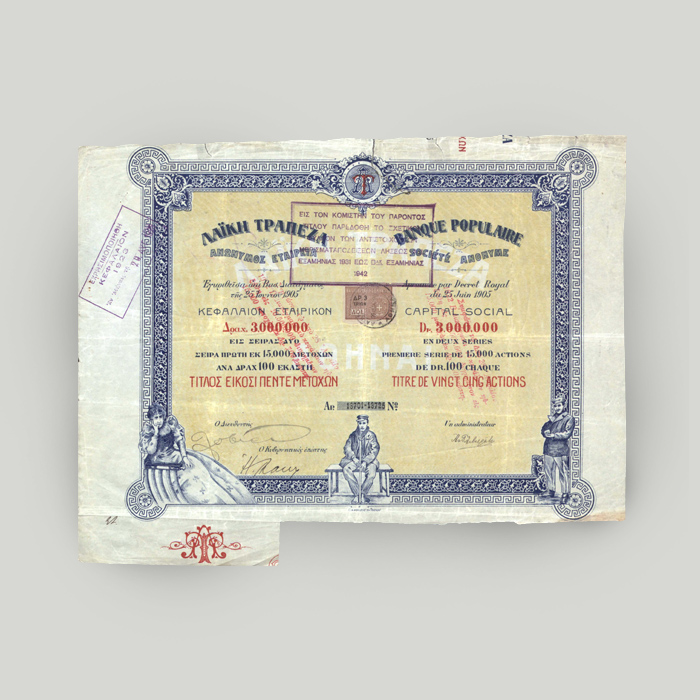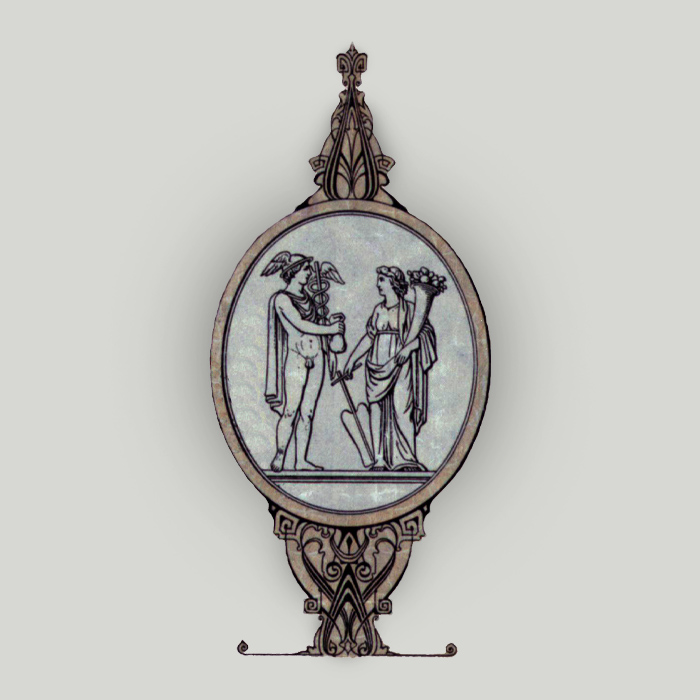Brief history of Commercial Credit Bank
Commercial Credit Bank was the only small bank to make it through WWII and the recession in the early 1950s. The bank made the most of the explosive growth in the Greek economy and developed a national network of branches. The Commercial Credit Bank 25-share stock certificate issued in 1965 belongs to the Alpha Bank debt securities and shares collection covering the years from 1948 to 1965.
Commercial Credit Bank 25-share paper stock certificate to the value of 410 drachmas, issued in 1918.
The bank logo appears at the top part.
The text appearing at the bottom includes the bank’s name, year of establishment and share capital, the number of shares and the nominal price of each share, in Greek and French.
The head of the Greek god Zeus appears as a watermark.
Against all odds
In 1947 Commercial Credit Bank, present-day Alpha Bank, was the only smaller bank that managed to make it through the hardship of war. It even survived the early 1950s recession.
For the first time after the Axis occupation in Greece, the bank:
- Posted profit in 1948 and even paid small dividends, as it would continue to do without exception for the next 60 years.
- Gave the first industrial loan out of the European Recovery Programme funds in 1950.
However, Commercial Credit Bank was still a small banking institution even after workflows were gradually restored. Out of its 121-strong workforce, 85 employees worked at the headquarters, while the rest staffed the few branches left after the war.
Following the 1950s currency stabilisation
The currency stabilisation of 1953 delivered a heavy blow to all banks.
However, Commercial Credit Bank not only endured the hardship but also managed to make the most of the explosive growth in the Greek economy in the years that followed.
From 1957 onwards, the bank no more depended on funding from the central bank, thanks to the massive increase in deposits.
Its credit-providing activities focused on imports and exports, with loans to small and medium businesses. However, it also increasingly turned to industrial loans.
The golden age
Gradually, Commercial Credit Bank stopped operating as a regional bank. It sought to develop a nationwide network of branches and steadily expand it.
1960 saw the beginning of a golden age for Greek economy.
In 1965 Manufacturers Hanover Trust Company, the 4th largest bank in the world at the time, participated in Commercial Credit Bank’s share capital increase. This boosted the growth of operations and the bank’s overall image in many ways.
In the same year, the bank entered into an agreement with Yugobanka, Yugoslavia’s export bank. The agreement aimed at supporting the import of industrial equipment into both countries with loans given by both banks.
Modernising technology and administration
From the late 1960s onwards, Commercial Credit Bank was on a path to modernise its technology and administration. Its operations changed radically over time:
- Modern cash registers were installed and, in 1971, the teller system was also adopted.
- Computerised accounting systems were used more extensively.
- Drive-in banking services were provided for the first time at the Psychiko branch.
In September 1972 Spyros Costopoulos resigned as general manager and was succeeded by Yannis S. Costopoulos. The change in the bank’s administration occurred at the same time as the renaming to Credit Bank was announced.
Commercial Credit Bank’s collection of debt securities
The Commercial Credit Bank 25-share stock certificate belongs to Alpha Bank's debt securities and shares collection.
Items in the collection date from 1948 to 1965.
Commercial Credit Bank in our publications
More information on Commercial Credit Bank is available in our publications:
- With Wisdom and Vision: ALPHA BANK, 19th – 21st Century, academic advisor: Kostas Kostis. The publication narrates the history of Alpha Bank, from founder J. F. Costopoulos’ first commercial ventures in the 19th century through to the present day. It also includes a wealth of unpublished photographic material, mainly from the Alpha Bank Historical Archives.
Buy the publication With Wisdom and Vision: ALPHA BANK, 19th – 21st Century on the Alpha Bank e-shop. - Alpha Bank/History ΙΙ: Commercial Credit Bank, 1947-1972, edited by Kostas Kostis. The catalogue showcases a selection from the extremely rich and diverse material of the Historical Archives, including photos, advertising leaflets, various banking documents, publications, artwork, cash registers etc.
The catalogue was published to accompany the exhibition of the same name held at the exhibition space of the Alpha Bank headquarters in Athens in 2013.
Buy the publication Alpha Bank/History ΙΙ: Commercial Credit Bank, 1947-1972 on the Alpha Bank e-shop.
The Alpha Bank Historical Archives are not open to the public.
Research visits can be organised upon request.
Contact us to request a visit.






